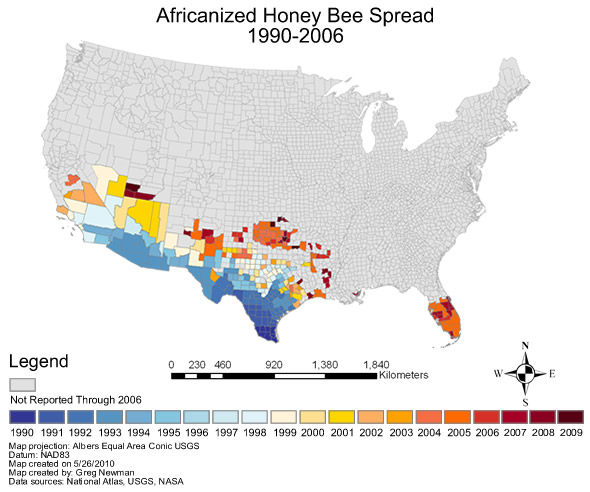
The Left is like the little boy who cried wolf. Everything is dire, critical, we will all die if we don’t (fill in latest cause celebre here.)
In the early sixties they were telling us school children we would be in an ice age in the ‘70’s, and, at about the same time run out of oil. They kept moving the date forward and then, as some point, decided that global warming had more money in it. So they switched to that. The news tick-tocks from Swine Flu to Beepocalypse to Trump will incinerate us all.
I’ve reached a point where I don’t even glance at these articles beyond the headline. One day, the wolf will eat the boy and nobody will give a damn.
A guy I work with is a third generation bee-keeper. He says the main reason bees are dying out is because they’ve bred so much aggression out of the bees that they no longer defend their hives the way they used to.
Bees are doing fine. There ARE some pesticide kills, contrary to this article, but that’s usually stupidity and misapplication.
The big issue is varroa: they weaken hives and make them susceptible to all sorts of nastiness. The cure, to the extent there is one, is to have more hives and accept that a higher mortality rate is here to stay.
Here’s the story on this subject which I gained at an educational seminar three weeks ago for pesticide users by a scientist (I forget his name offhand, but he is well known in the University of Wisconsin system).
Short answer to the effects of pesticides on bees: no one knows because the research has not been done. I should add that research in this case involves product by product studies. There is as I recall one product formulation that has been well documented (again I forget which) in studies and does not have any effect on bees. But it is the ONLY one.
All stories are either A) anecdotal, B) are exaggerated, C) due to human error.
One of the most popular among the anti-pesticide crowd is an incident which happened in Oregon. “50,000 bees in mass killing due to pesticides!!” Truth was that it was 25,000 bees. Why did they die? Linden trees were being sprayed by a commercial applicator for Japanese Beatles - this is normal. I forget the product in question, but the product label clearly says, “Warning: Do NOT use on Linden trees in flower.” Pesticide labels are law. Not following the label directions in a prosecutable violation.
The commercial sprayer clearly ignored or did not read the product label and so killed the bees. It was his fault not the product’s.
All pesticide products are divided into a few limited chemical groups. Manufacturers reformulate a particular product for their needs. This new pesticide product is not the same as a similar one by the same or another manufacturer even though the use (target) is the same and so must undergo a testing regime against the target and against various environmental concerns of which bees are just one.
Many laymen think that the only really bad pesticide is glyphosate (aka: Roundup) - its actually among the more benign when properly administered (label directions followed). Most formulations break down in a few days into harmless compounds. There are strict rules about just how often these products can be applied, and in what percentage per acre during a given year in commercial applications (non commercial users just want it to work and seldom read the label or understand what they are reading hence the rise of RTUs (ready to use) products).
There is NO research on the effects of glyphosate on bees.
In this case, I do not believe neonictinoids should be written off.
We do end up ingesting them at certain points in the food chain.

All I know is that I am up to my neck in bumblebees. The are still going after the flowers on my raspberry bushes, which makes picking the berries getting ripe “interesting”.
The funny part is that for beekeepers, their hives prosperity is their prosperity, so being a smart group of people, they have acted wisely, judiciously, and cooperatively with each other, (with minimal government involvement, I should add), and there are now far *more* bees than there were before the “colony collapse disorder” was first recognized.
How do they do this?
In past, beekeepers intentionally limited the number of hives instead of propagating new ones. Because larger hives equals more honey (and less work). However, when their hives were at risk, they began cloning their hives.
Granted more work, but more hives also produce more honey.
Next, beekeepers will transport their hives to fertilize particular crops. This created a problem because a healthy hives territory could overlap with an unhealthy hive, typically a wild hive.
Their solution was to both set exclusive territories and timetables from each other, and to keep a watch for wild hives.
Lastly, they work with farmers to avoid areas that have been recently treated with pesticides. By working around the problem, like using pesticides after the flowering cycle is over, no problem.
“As Prime Minister Jim Hacker quipped in the theatrical version of the British comedy series Yes, Prime Minister: “Computer models are no different from fashion models. They’re seductive, unreliable, easily corrupted, and they lead sensible people to make fools of themselves.”
What a great quote!